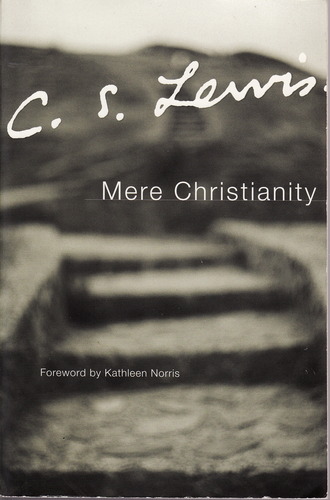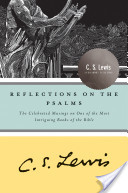
I am always thankful that the first theology book I ever read was C.S. Lewis’s Mere Christianity. I stumbled upon it in the B. Dalton Bookseller at the local mall early in the summer before my senior year in high school, was intrigued, took it home and devoured it in less than a day. From then on I read anything I could get my hands on by Lewis: Miracles, The Great Divorce, God in the Dock: Essays on Theology and Ethics, The Abolition of Man, you name it. Lewis’s clarity, cleverness, creativity, intelligence, and piety all captured my imagination. My love affair with his writings transformed my faith and my life from that of just muddling through, to being thoughtfully engaged in thinking about God, the universe and everything. For that I will be ever thankful.
But I am thankful, too, to have had Lewis early on as a hero because from him I learned that there were far more theological options available to the serious Christian than what is being offered on American Evangelicalism’s theological menu. There are lots of things I could cite: his coziness with evolution, his openness to purgatory, his ambivalence about atonement theories, and so on.
Today I wanted to highlight Lewis’s take on the Bible. Lewis’s view of the Bible draws deeply both from his intimate knowledge of the Church Fathers and the Medieval Doctors of the Church, and his awareness of modern biblical scholarship. That is to say, he creatively draws from the deep resources of the Church’s grand tradition in order to think through the contemporary problems posed by modern historical-critical scholarship.

For Lewis, the Bible, while being a vessel of the divine Word, is a profoundly human collection of documents. Here is a representative passage from Chapter XI in his book Reflections on the Psalms:
The human qualities of the raw materials show through. Naïvety, error, contradiction, even (as in the cursing Psalms) wickedness are not removed. The total result is not “the Word of God” in the sense that every passage, in itself, gives impeccable science or history. It carries the Word of God; and we (under grace, with attention to tradition and to interpreters wiser than ourselves, and with the use of such intelligence and learning as we may have) receive that word from it not by using it as an encyclopedia or an encyclical but by steeping ourselves in its tone or temper and so learning its overall message.
This position, needless to say, would not meet with approval from all Evangelicals. That is, in part, because we Evangelicals often frame our doctrine of Scripture with an a priori argument that goes something like this:
- Premise 1: The Bible is God’s inspired Word
- Premise 2: We know a priori that God just would or wouldn’t inspire His Word this or that way.
- Conclusion: We know a priori that the Bible simply cannot be this or that way.
But Lewis thinks that this a priori approach to thinking about the Bible is a nonstarter:
[There] is one argument which we should beware of using’: God must have done what is best, this is best, therefore God has done this. For we are mortals and do not know what is best for us, and it is dangerous to prescribe what God must have done-especially when we cannot, for the life of us, see that He has after all done it.
Instead, says Lewis, when figuring out just how the Bible is God’s Word, we should take a humble a posteriori approach, looking and seeing what kind of book He has actually given us before making making grand doctrinal declarations. And this is par for the course when dealing with the God of surprises Who, against all expectations, sent His Son to die on the cross and sent His Spirit even to anoint unwashed Gentiles and rot-gut sinners. As with everything else in Christianity, so it is with Scripture.
We may observe that the teaching of Our Lord Himself, in which there is no imperfection, is not given us in that cut-and-dried, fool-proof, systematic fashion we might have expected or desired. He wrote no books. We have only reported sayings, most of them uttered in answer to questions, shaped in some degree by their context. And when we have collected them all we cannot reduce them to a system’.He will not be, in the way we want, “pinned down.”
In many, many ways the Bible defies our a priori theological expectations of what the Bible should be. In each case, however, our response should not be to force the Bible to fit what we thought or were taught it must be, but to humbly accept it as it is given to us, trusting Him who is ultimately its giver. As Lewis says, “Since this is what God has done, this, we must conclude, was best.”

Nowadays lots of folks are getting worked up about the precise relationships between the Bible and history and science and the like. These are difficult and important subjects, to be sure. But I have always been comforted by the fact that even if I were to conclude that the Bible doesn’t always give us “impeccable history or science,” all is not lost. Perhaps God is giving us something better than “impeccable history or science,” something more needful for our souls. It means, too, that I might be standing with my old teacher, C.S. Lewis, and that’s not too bad.
Click here to read Part 2 of C.S. Lewis on Scripture. God’s Word in Human Words.
David Williams serves part-time as an InterVarsity/Link staff on loan to the Oxford Pastorate, an independent evangelical chaplaincy that ministers to graduate students at the University of Oxford. He is currently pursuing his doctorate in Christian Ethics at the University of Oxford, writing on Friedrich Schleiermacher’s, John Henry Newman’s, and Abraham Kuyper’s divergent theologies of higher education and their potential applications to the modern research university. Before moving to England, David served for five years with InterVarsity’s Graduate & Faculty ministries at New York University. David resides in Oxford, England with his wife Alissa and son Charlie.

Pretty good piece. You could sure be standing with someone worse. I guess in that case so could I.
Thanks, Charles. I hope you found it helpful.
Excellent post. Fascinating, it is, that the most eloquent apologist for Christianity in the 20th century would be thrown out of most “Bible-believing” churches. Given his engagement with George MacDonald’s theology, that should hardly come as a surprise.
Thanks, David! Yes it is fascinating and not a little ironic.
Hello David, thanks for having shared your own experience with Lewis!
I’ve turned away from Evangelicalism but still think many of Lewis insights extremely valuable.
It is clearly refreshing that he rejected Biblical inerrancy and was open to God’s actions in other religious traditions however mistaken many of their beliefs might be.
On my blog I am trying to develop a third way besides liberalism and conservatism which I have labeled Progressive Christianity for lack of a better term and you’d be most welcome to comment there.
Lovely greetings from continental Europe.
Lothars Sohn – Lothar’s son
http://lotharlorraine.wordpress.com